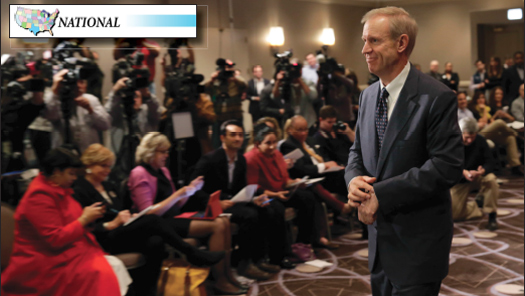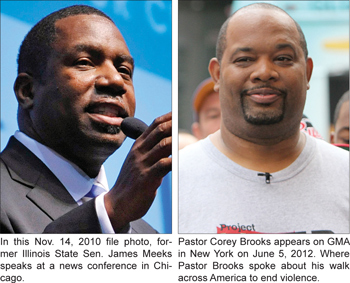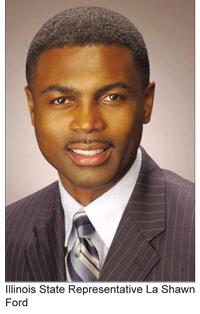Time for political accountability
By Ashahed M. Muhammad -Assistant Editor- | Last updated: Nov 20, 2014 - 1:14:27 PMWhat's your opinion on this article?

CHICAGO (FinalCall.com) - When Illinois Governor-elect Bruce Rauner introduced members of an advisory transition committee that would assist him in planning during the months prior to taking office, it ended a vicious political cycle in which negative campaign ads flooded television and radio.
“I am committed to assembling a diverse and talented team to drive results for our state and bring back Illinois,” Mr. Rauner said. “It is an honor to have such a talented group of individuals working with me to get our state working for the people again.”

|
Chicago pastors James Meeks, who leads the House of Hope, and Corey Brooks of New Beginnings Church were named as key members of the committee. Both were largely responsible for much of the Black support Governor-elect Rauner received as he rode to victory over incumbent Democrat Pat Quinn. Mr. Rauner will be the first Republican governor of Illinois in over a decade and assumes office on January 12, 2015.
While many of defeated Gov. Quinn’s supporters still vigorously discuss reasons why he lost the election, others within the Black community are moving forward, shifting their focus to holding the Republican governor-elect accountable and trying to solve problems facing Chicago’s Black residents.
Illinois State Representative La Shawn Ford’s 8th District covers a large portion of Chicago’s West Side. He congratulated Mr. Rauner on his victory but urged the political neophyte to begin his leadership “in a more inclusive process.”
“The West Side of Chicago is in need of attention, and this administration is off to a bad start if it is not fully recognizing every community. There are qualified West Side leaders who can offer insight as members of Mr. Rauner’s transition team,” said Rep. Ford.
Rev. Meeks and Pastor Brooks maintain large houses of worship and their support base is located primarily on the city’s South Side.
According to statistics from the Illinois Department of Economic Security, less than half of all working-age Blacks statewide are employed, and those who are working make 25 percent less than the statewide median household income which is $56,250. The U.S. Census Bureau’s 2013 American Community Survey found the media household Black income in Illinois was $34,815.

|
Chicago newspaper publisher Hermene Hartman was among the first visible and vocal Blacks supporting Mr. Rauner and she worked as a paid staffer for his campaign. She was responsible for outreach to the Black community as a political strategist.
“In America we have a two-party system—the Republicans and the Democrats. We (Blacks) are participating by and large in a single party. The Democrats disrespect us. They do whatever they want to do, and the Republicans don’t do anything at all,” said Ms. Hartman.
The Republican Party has ceded the Black vote to the Democratic Party and the Democrats believe Blacks have no other place to go, which diminishes the collective power of the Black vote, even in places where Blacks enjoy numerical superiority, she noted.
“For us to get locked into a single party—that is ridiculous,” she said.
Mr. Rauner’s focus on attracting businesses to Illinois was the reason Ms. Hartman supported him. Her discussions with Mr. Rauner focused on economic development and revitalization of Black communities such as Roseland, Englewood and Lawndale. Black economic empowerment is vital to resurrect these communities and to halt what she calls “a foreign invasion” of Arabs, Koreans and Chinese owning the main types of businesses occupying Black neighborhoods: cleaners, nail shops, liquor stores, beauty salons and beauty supply stores.
She sees breaking out of traditional “plantation politics” and “jumping outside the box” of the Democratic Party as key to progress. Casting “votes for the person and not the party” is the future strategy for nationwide Black political empowerment, she argued.
“How about let’s negotiate as opposed to giving the vote away?” said Ms. Hartman. Not using Black voting power in that way means “you’ve accepted and bought into the concept of being minorities or less than, as opposed to activating your power for what it is,” she added.
Black support for Republicans is still very controversial whenever it occurs. It was not uncommon to hear Blacks on talk radio, in barbershops, and using other forums like social media, to directly insult those who chose to align themselves with Mr. Rauner. Pastor Brooks and his family received death threats. Ms. Hartman fielded her share of insults as well, which surprised her.
“There’s a lot of ignorance, stupidity and hostility. I had no idea that things would get so vicious,” said Ms. Hartman. “The viciousness was appalling to me, especially when it came from people that I know and have worked with for many, many years—that was bizarre,” she added.
Ms. Hartman said young people should have jobs in their neighborhoods and not have to travel to the suburbs to work. Although admittedly a controversial viewpoint, Ms. Hartman said the biggest legal business in the Black community actually controlled by Blacks is the church.
“That’s the biggest business in the Black community—the church—and we have turned our churches into social agencies. Our churches are social service agencies and recreational centers,” she said.
Political pain for Democrats
The Democrats were trounced during the 2014 mid-term elections. Many Democrats chose to keep President Obama at arms distance during their campaigns and although the losses were many, the loss of the governor’s seat in Illinois especially stung since this is the president’s home state. First Lady Michelle Obama personally came to Illinois and did radio spots to generate support for Mr. Quinn. It wasn’t enough to get him a victory.
According to the Chicago Board of Elections Mr. Quinn easily won the city and Cook County, with 77 percent of the vote, however, Mr. Rauner’s 20 percent helped his totals and he won all the other counties in Illinois. Mr. Quinn still received votes from Blacks in the mid-to upper 90 percent range, however, Blacks were not inspired by his candidacy enough to come out to show support in droves. Some even chose to support Mr. Rauner. Many Chicago voters—not just Blacks—are dissatisfied, disenchanted and will not vote for bland candidates. Seeking support simply based on party loyalty was not enough and it showed in low voter turnout. There are 1.3 million registered voters in Chicago, only about half voted for governor.
Jedidiah Brown, 28, and national president of Young Leaders Alliance, said it would be a mistake to think that young people are not interested in politics. Those seeking political office simply have not reached youth and such was the case with the race for governor in Illinois, he said. Mr. Quinn broke many promises and was not in touch with the needs of the community, said Mr. Brown.
“He was not an effective leader,” said Mr. Brown. “We saw him parading around in our religious institutions, preaching in our pulpits shaking hands, taking pictures and making promises, and people saw through that,” he said.
Afrika Porter, a community activist who mentors young women throughout the community, said despite the results of this or any other election, the same problems and conditions remain. Only Black unity and the development and implementation of a Black agenda will improve those conditions and solve the problems, she said.
“We voted early or we voted on Nov. 4, we awoke on Nov. 5 to the same conditions,” said Ms. Porter. “We must unite and organize like never before as if our lives depended on it.”
Mr. Brown, who is also a candidate for alderman of the 5th Ward, said he and many others are willing to give Mr. Rauner a chance and to hold him accountable.
“He is our governor now and we need to work with him, as long as he is willing, and we need to organize and advocate when he wants to act like he is not. The people have spoken and we must give this man a shot to be our governor,” said Mr. Brown.
INSIDE STORIES AND REVIEWS
-
-
About Harriett ... and the Negro Hollywood Road Show
By Rabiah Muhammad, Guest Columnist » Full Story -
Skepticism greets Jay-Z, NFL talk of inspiring change
By Bryan 18X Crawford and Richard B. Muhammad The Final Call Newspaper @TheFinalCall » Full Story -
The painful problem of Black girls and suicide
By Charlene Muhammad -National Correspondent- » Full Story -
Exploitation of Innocence - Report: Perceptions, policies hurting Black girls
By Charlene Muhammad -National Correspondent- » Full Story -
Big Ballin: Big ideas fuel a father’s Big Baller Brand and brash business sense
By Bryan Crawford -Contributing Writer- » Full Story






 Click Here Stay Connected!
Click Here Stay Connected!








